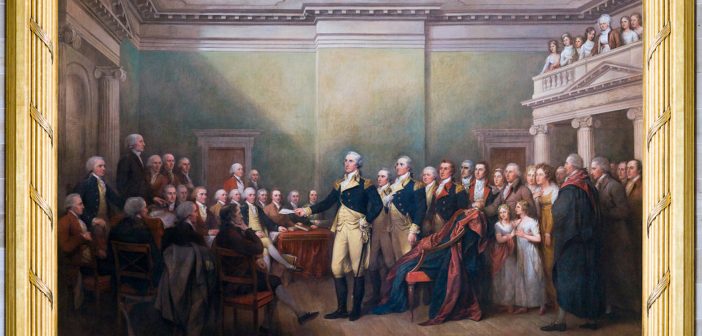On Dec. 23, 1783, George Washington resigned as leader of the Continental Army during a speech to the Second Continental Congress in the Maryland State House’s senate chamber.
“Having now finished the work assigned me, I retire from the great theatre of Action; and bidding an Affectionate farewell to this August body under whose orders I have so long acted, I here offer my Commission, and take my leave of all the employments of public life,” he said, according to a transcript of the speech made available online by the Library of Congress. A copy of his handwritten final draft of the speech is also available online, via the Maryland State Archives.
According to the Library of Congress, Washington, a newly-minted civilian, left Annapolis, Maryland, at dawn the next morning – Christmas Eve — en route to his home in Mt. Vernon, Virginia.
Washington’s choice to step down from military leadership “was of great significance to the post-revolutionary United States,” the Maryland State Archives’ State House Office of Interpretation wrote in a Dec. 2013 blog post commemorating the anniversary.
“Not only did he set the precedent that the President is the Commander-in-Chief, but by giving up his position as commander-in-chief, he placed his power and his status as a national hero in the hands of Congress,” they wrote. “It was this empowerment of Congress that helped to ensure no one body held too much influence, and became a great action in the movement towards a balanced democracy that we enjoy today.”
The moment has since been memorialized in an 1824 painting by John Trumbull, which now hangs in the US Capitol Rotunda in Washington.
The Second Continental Congress unanimously elected Washington as commander-in-chief on June 15, 1775, and he was officially commissioned four days later. He took command of the Continental Army on July 3, 1775, and lead American forces for the next eight years.




